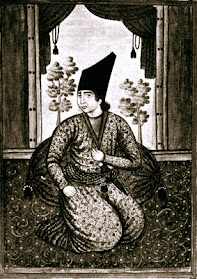It was while Horace and his wife were living in Siena,
Italy, in 1911, that he heard of the arrival of ‘Abdu’l-Baha and his party in
Thonon-les-Bains, France, As they had been hoping to make the pilgrimage to the
Holy Land in order to meet the Master they lost no time in seizing this golden
opportunity to attain His presence and left immediately for the small watering
place on Lake Geneva, where they arrived on the afternoon of August 29th.
Horace, in his account of this meeting with ‘Abdu’l-Baha, wrote that he had felt
that if he could only look upon the Master from a distance, this would satisfy
his pilgrim’s heart. He then goes on to describe what this privilege of
spending a few days near ‘Abdu’l-Baha meant to him:
“I saw among them a stately old man, robed in a
cream-coloured gown, his white hair and beard shining in the sun. He displayed
a beauty of stature, an inevitable harmony of attitude and dress I had never
seen nor thought of in men. Without having ever visualized the Master, I knew
that this was He. My whole body underwent a shock. My heart leaped, my knees
weakened, a thrill of acute, receptive feeling flowed from head to foot. I
seemed to have turned into some most sensitive sense-organ, as if eyes and ears
were not enough for this sublime impression. In every part of me I stood aware
of ‘Abdu’l-Baha’s presence. From sheer happiness I wanted to cry -- it seemed
the most suitable form of self-expression at my command. While my own
personality was flowing away, a new being, not my own assumed its place. A
glory, as it were from the summits of human nature poured into me, and I was
conscious of a most intense impulse to admire. In ‘Abdu’l-Baha I felt the awful
presence of Baha’u’llah, and, as my thoughts returned to activity, I realized
that I had thus drawn as near as man now may to pure spirit and pure being... I
yielded to a feeling of reverence which contained more than the solution of
intellectual or moral problems. To look upon so wonderful a human being, to
respond utterly to the charm of His presence -- this brought me continual
happiness. I had no fear that its effects would pass away and leave me
unchanged. I was content to remain in the background...












.jpg)










